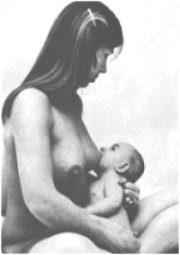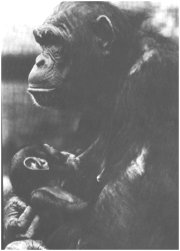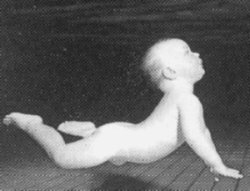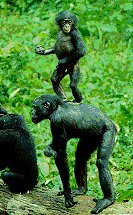

Another character distinguishing Homo sapiens from the other apes is our lack of body hair and excess of fat. Although we have the somewhat more hair follicles than our close relative the chimpanzee, the hair which is produced is very fine and short, giving us a hairless appearance. We have ten times the amount of fat cells (adipocytes) than the chimp as well, so clearly seen in when comparing the young of both species.
 |
It is clear that newborn humans are far fatter and heavier than newborn chimps. This fat begins to deposit in the seventh month of pregnancy very quickly and doesn't slow down until well after the first year of birth (Morgan 1997). One of the main causes for death of aboreal primates is falling out of the tree and onto the hard ground. If the early hominids lived over water, fat would be a good thing if the animal fell from the tree, it would assist in floating and increase survival rate from falls (Morgan 1997). Human babies are incredibly good floaters! |

|
 Humans have about 10 times the "adipocytes" as of any other primate (Pond 1987). Even our babies are quite plump compared to other apes. |
Fat Facts
1. Fat encourages bouyancy |
 Pan panicus (Bonobo) Photo by Franz Lanting |
|
This loss of hair and gaining of fat, has been explained away as a cooling/heating mechanism. The accepted theories argue that the
hot arid grasslands caused us to lose our hair and begin to sweat in order to keep cool.
The fatty layer under our skin then developed to keep us warm at night (Wheeler 1984).
The energy costs in maintaining this fat layer are quite high, so it appears unlikely that a
species would go to so much trouble to first lose its
fur or hair, and then aquire a layer of "blubber" soley to stay cool during the day and warm at
night. No other savanna
dweller has done either of these things. No other purely terrestrial animal has ever adopted
these strategies for thermoregulation, not to mention that humans are notorious
wasters of water. When we sweat, we lose salt and water. We tend to urinate more frequently
than other primates and our urine is very dilute. Our ancestors would have had to stay near
fresh water supplies, which are few and far between (not to mention predator laden), on the African
savannas (Verhaegen 1999).
|